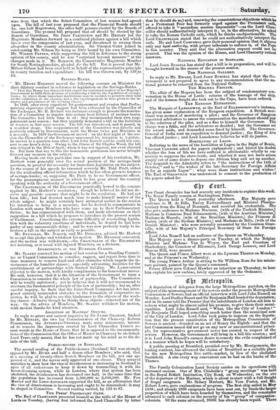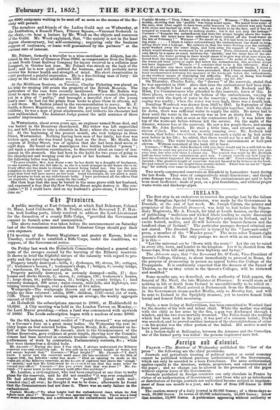'be
A deputation of delegates from the large Metropolitan parishes, on the subject of the mismanagement of the sewers under the present Metropolitan Commission of Sewers, bad an official interview with Lord John Russell on Monday. Lord Dudley Stuart and Sir Benjamin Hall headed the deputation; and in its name told the Premier that the inhabitants of London ask him to redeem what might be almost called his promise, to give them their muni- cipalities. Lord John Russell said, " What, like the City of London ?" Sir Benjamin Hall hoped something much better than the municipal acts of the City of London. Lord John took pains to impress on the deputa- tion that the present constitution of the Metropolitan Commission of Sewers is ancient—founded on an act of Henry the Eighth—and that the last Commission issued did not go on any new or unconstitutional princi- ple, for representative government never has existed in respect of the sewers. However, the Government will bring in a bill this session; and it is Lord John Russell's earnest desire to remedy the evils complained of in a manner which he hopes will be satisfactory.
A public meeting at Brentford, presided over by Mr. Montgomerie, the leading resident, has advanced the claims of Brentford as a suitable place for the new Metropolitan live cattle-market, in lieu of the abolished Smithfield. A site every way convenient can be had on the banks of the Thames.
The Family Colonization Land Society carries on its operations with increased success. One of Mrs. Chisholm's "group meetings" was held in the Royal British Institution, City Road, on Wednesday, on the eve of the departure of the Mariner, which is about to start with a full freight of frugal emigrants. Mr. Sidney Herbert, Mr. Vera Foster, and Mr. Robert Lowe, gave explanations of progress. The first ship sailed in May 1850 ; and already 2000 emigrants have been sent out, by funds the larger proportion of which have been hoarded by themselves, and the remainder advanced to each colonist on the security of his " group" of companion- colonists. Of the sums advanced, 20001. has already been repaid. There are 18060 emigrants waiting to'be sent of as .soon as the means of the So- ciety will permit.
The members and friends of the Ladies Guild met on Wednesday, at the Institution, 4 Russell Place, Fitzroy Square,—Viseount Goderieh in the chair,—to hear a lecture by Mr. Wood on the objects and resources of the Guild. Mr. Wood explained, that, "the society is not in the least degree eleemosynary, but self-sustaining ; requiring only the business support of customers, or loans well guaranteed by the partners" at the current rate of interest.
Mr. Palmer, formerly a traveller to a wine-merchant in Aldgate, has ob- tained in the Court of [Summon Pleas 20001. as compensation from the Bright- on and South Coast Railway Company for injury received in a collision near Lannert, in October last year. Mr. Palmer was struck on the back of the head; and he is now quite unfitted for business, and will probably never recover his former health and strength of mind. His short examination in court produced a painful impression. He is a fine-looking man of forty : his salary at the time of the accident was 3501. a year.
At the Middlesex Sessions, on Tuesday, Charles Pickering was placed on his trial for stealing 240 prints the property of the British Museum. The particulars of the case were recently mentioned. When Mr. Bodkin was about to open the case for the prosecution, the prisoner's counsel interposed, put in a plea of " guilty," and besought a merciful view of the young man's ease : he had cut the prints from books to place them in albums, not to sell them. Mr. Bodkin joined in the recommendation to mercy. Mr. F. Smith, a Sussex Magistrate, stated that the prisoner had been tutor to his children ; he was a man of great attainments, and hitherto his character had been unblemished. The Assistant judge passed the mild sentence of three months imprisonment.
In Westminster, about seven years ago, an engineer named Stone died, and was buried in the Broadway churchyard. His widow was left improvided for, and left London to take a situation in Kent ; Where she was not success- ful. At the beginning_ of the present month, she took lodgings in Dean Street, Westminster. Nothing having been seen of her lately, her door was broken open, and she was found lying dead on the floor. Mr. Heath, the surgeon of Bridge Street, was of opinion that she had been dead seven or eight days. He found on the mantelpiece two bottles labelled "poison " ; and upon a post-mortem examination, lie discovered about an ounce of lau- danum in the stomach. She had been in the habit for two years of going to the churchyard and weeping over the grave of her husband. In her room the following letter was found. "To save trouble, Mrs. Ann Stone came by her death by a draught of laudanum, no one knowing that she did take it, as she is a total stranger in the house she is in. Every effort she has made to obtain an honest living failed her. She has the pre- sumption to throw her soul into the presence of the Almighty, and she fervently prays that God will have mercy on her soul. Good Christians, do not allow a num- er of persons to look on my unfortunate body. I have performed all the offices that are requisite; the body is quite ready for the coffin."
She then begs that she may be buried in the same grave with her husband, and expressed a fear that the New Victoria Street might destroy it. She con- cludes—" If I could have died on my husband's grave-stone, I would have done so:"



























 Previous page
Previous page